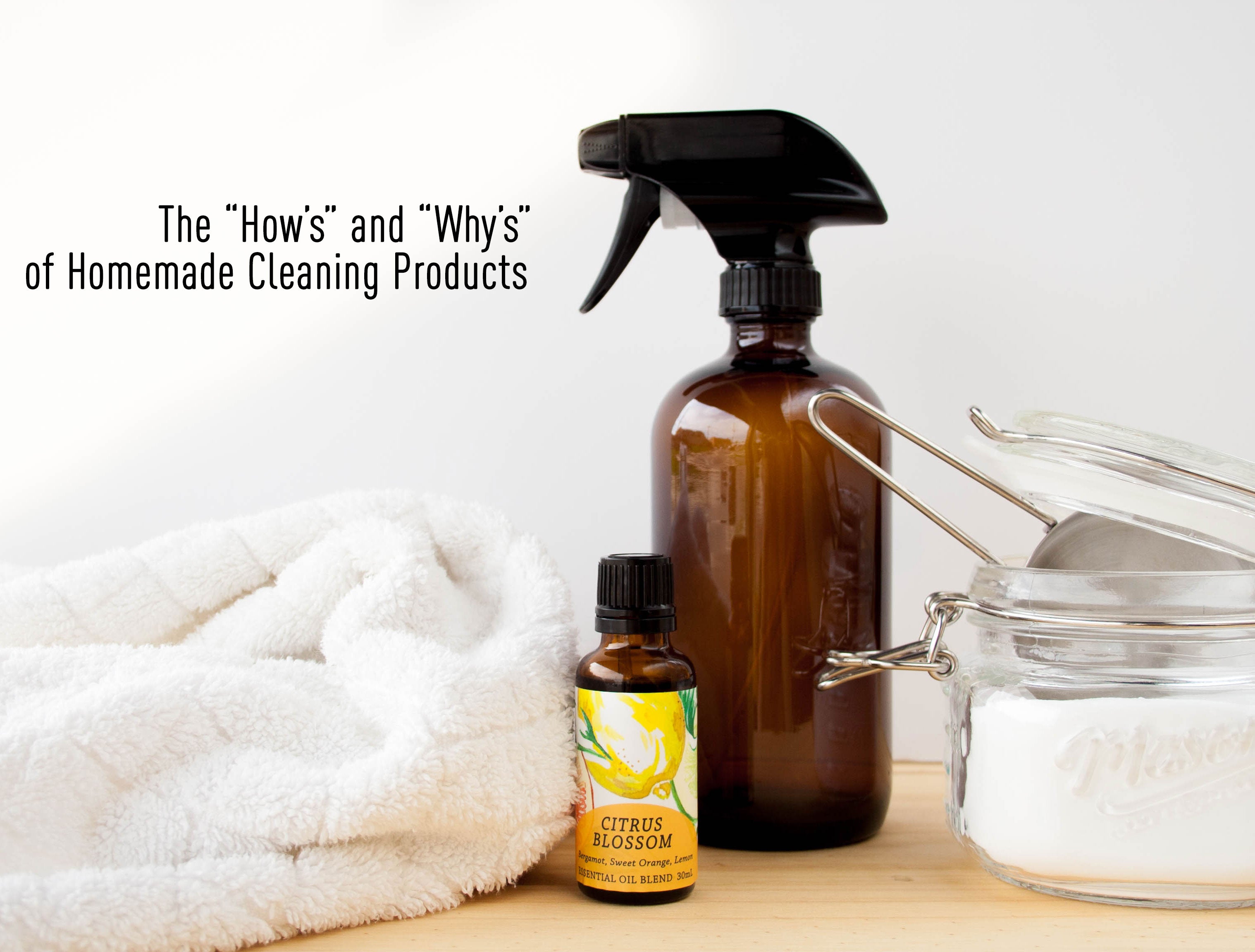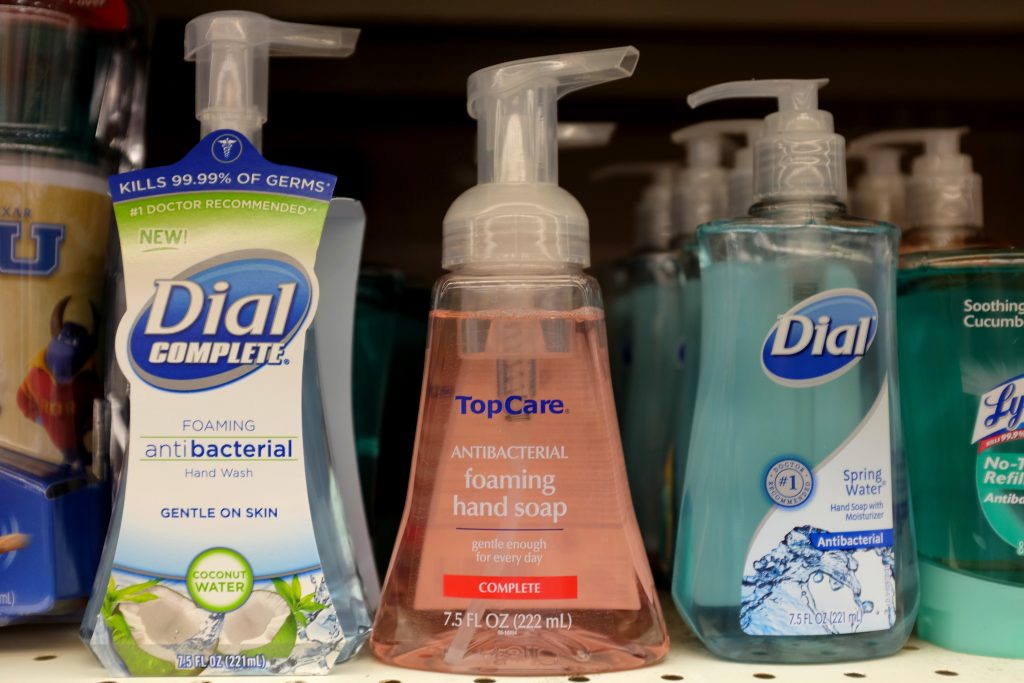
The "How's" & "Why's' of Homemade DIY Natural Cleaning Products

For me, one of the heralds of Spring is an intense desire to clean every nook and cranny of my house. And over the past few years I've become more and more aware of the products that I use. While there are definitely jobs that call for "heavy hitters," I'd prefer to not use cleaners that require a hazmat suit for my everyday messes.
When it comes to natural DIY cleaners two major concerns come to mind. Firstly, I'm a skeptic so my thoughts always wander to "Yea, but does it actually work?" And secondly, do I really have the time/energy/money to make all these cleaners myself? The answers are yes and yes.
Let's tackle the second concern first.
As I started my research I found that most of the elements of these cleaners were things that I already had in my house: vinegar, baking soda, dish soap, rubbing alcohol, etc. The biggest investment and the items you wouldn't necessarily have "on hand" are essential oils. But in my opinion essential oils are so versatile that I can't really argue against having them around all the time.
Making my own cleaners means I don't have to make a trip to the store every time I run out soft scrub or glass cleaner. I buy the ingredients in bulk, most of which are already getting used in the kitchen anyway. The added bonus is, outside of essential oils, pretty much every other ingredient is dirt cheap. So at this point I'm asking myself, "why doesn't everyone do this?"
Which brings us back around to our first concern: Do they work? And rather than bore you with my anecdotal evidence, lets look at each ingredient.
Distilled White Vinegar: The magical component of vinegar is acetic acid. On a surface level this acid does a great job of dissolving dirt, grime & soap scum and it dries relatively streak free--which makes it perfect for cleaning glass. Acetic acid also makes vinegar a powerful disinfectant because it can cross the bacteria’s cell membrane effectively killing it.
Baking Soda: This mild alkali packs a punch! Not only does it dissolve dirt & gunk, its gritty, abrasive texture make it great for scrubbing stubborn dirt or stains on your counter/sink/bathtub/pretty much anywhere. Baking Soda is also a miraculous deodorizer owing to its ability to absorb unsavory smells, not just cover them up.
Fragrance Free Dish Washing Detergent: Ok, so before you think "wait, why don't you just use your foaming soap?" there is a specific reason that I'm recommending dish washing detergent over our fragrance free foaming soap and that specific reason is glycerin. Our hand soaps were formulated to be used on, you know, hands. Glycerin is an excellent humectant, which is a major reason why our soaps leave your hands feeling so soft. However, glycerin can also leave behind streaks and film on some surfaces. Detergents are great at tackling greasy dirty dishes, so why wouldn't it also be good at cleaning dirty floors or a soap-scummy bathtub? (spoiler alert: its great at both)
Rubbing Alcohol: Another super powerful disinfectant, rubbing or isopropyl alcohol is a solvent. The argument can be made that isopropyl alcohol does an even better job than vinegar at disinfecting surfaces. However, be careful on finished surfaces as it can also dissolve varnishes, always keep the windows open, and never never never mix with bleach. Because isopropyl alcohol is so volatile it evaporates very quickly which makes it great for keeping stainless steel shiny and streak free. The quick evaporation also makes it ideal for room sprays.
Essential Oil: This is where you can get a little creative! Two of my favorite blends to use for cleaning are Bandit's Oil and Citrus Blossom, as both have very strong antibacterial and antiviral properties. Other great essential oils for cleaning are: Bergamot, Eucalyptus, Lavender, Lemon, Peppermint, Sweet Orange and Tea Tree. Certain essential oils can be toxic to pets when ingested, so use caution when using essential oils on floors & carpets.
OK, so now that we know about our ingredients, let's get ready to clean with some simple , effective recipes:

All Purpose Cleaning Spray:
16oz Spray Bottle
1 tsp Fragrance Free Dish Soap
40 Drops of Essential Oils
Fill with Water (preferably distilled)
I use this all purpose spray on everything: counters, sinks, bathtubs. I even use this recipe to clean my floors, but I change the ratio slightly to 2 TBSP dish soap per gallon of water. Need a little bit of scrub? Sprinkle a little bit of baking soda (before or after you spray) and apply some good old fashioned elbow grease. I find this particularly useful for cleaning kitchen sinks.
Glass Cleaner:
1/4 Cup White Vinegar
1/4 Cup Isopropyl Alcohol
1 TBSP Cornstarch
2 Cups Water (distilled or filtered will yield the best result)
10 Drops of Essential Oil (optional--if you don't like the smell of vinegar)
Add all ingredients to a spray bottle. Make sure to shake before use as the cornstarch will settle to the bottom. Don't substitute baking soda for cornstarch unless you are trying to create a volcano (also, vinegar and baking soda neutralize one another). I find that coffee filters and newspaper work better than microfiber or paper towels at producing a streak free result.
Carpet Freshener:
1 Cup Baking Soda
10-15 drops of Essential Oil
Jar with a shaker top (optional)
Sprinkle over carpets (& upholstered furniture). Allow time for baking soda to absorb unwanted odors before following up with your vacuum.
Happy Cleaning! Let us know about your favorite natural cleaning formulas and techniques.




Leave a comment
This site is protected by hCaptcha and the hCaptcha Privacy Policy and Terms of Service apply.